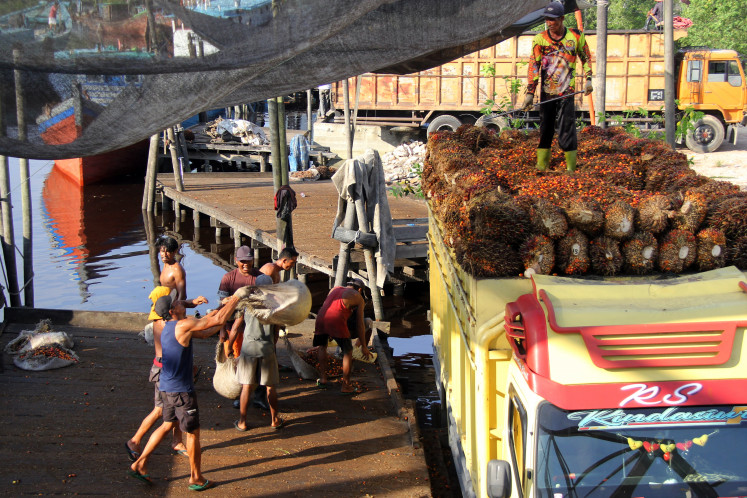Popular Reads
Top Results
Can't find what you're looking for?
View all search resultsPopular Reads
Top Results
Can't find what you're looking for?
View all search resultsTradition preserves female circumcision
Fauziah Erwin, 36, is a lawyer based in Makassar, South Sulawesi
Change text size
Gift Premium Articles
to Anyone
F
auziah Erwin, 36, is a lawyer based in Makassar, South Sulawesi. While well-educated and possessing a good career, she still holds tradition and religious values very dearly in her life.
In the predominantly Muslim province where she grew up and currently lives, female circumcision is commonly performed at a young age. She had it done when she was a little girl, now she is arranging it for her 8-year-old daughter.
Fauziah said she used to object to the procedure, also known as female genital mutilation (FGM), as she had read much about its impact on health. She said she was also aware that the WHO had banned the practice.
But her mother has passed on religious and moral insights, as well as convincing her that circumcision has no negative impact on her sexual and reproductive health.
“My mother said there were great and important messages in the sacred procedure: to remind girls to protect themselves, especially their purity,” Fauziah told The Jakarta Post.
A UNICEF report revealed in 2016 that Indonesia was among the countries with the highest prevalence of FGM, which, according to the WHO, includes all procedures that involve partial or total removal of the external female genitalia, or other nonmedical injury to the female genital organs.
Based on a worldwide survey, the report estimated that half of girls under 11 years old in Indonesia were circumcised, and combined with the cases in Egypt and Ethiopia, half of 200 million girls and women in 30 countries had undergone FGM.
In 2014, the Health Ministry issued Health Ministerial Regulation No. 6/2014, which removed the previous ministerial regulation that contains the nation’s guidelines for female circumcision practices in Indonesia.
Although it does not ban female circumcision, the latest regulation emphasizes that female circumcision is not a medical procedure and that science has not proven the benefits of the practice to the child’s health.
Now, five years since the new regulation was issued, female circumcision is still rampant, especially in the Muslim community, who do it as proof of their adherence to Islam.
In Muslim communities such as in South Sulawesi, the procession of female circumcision is strongly associated with Islamic and cultural tradition. In the procession, the girls are asked to wear a silk bodo, traditional women's clothing of the Bugis tribe from Makassar. They also usually wear bridal jewelry.
Before the circumcision, the girls are asked to perform wudhu (ablutions) and recite the Islamic shahada, an Islamic creed that declares that Allah is the one and only God and that Prophet Muhammad is God’s messenger. Therefore, usually the circumcision is given to the girls when they are over five years old and before they begin menstruating, so they will be able to recite the shahada.
The tradition in South Sulawesi has been around for centuries. Usually, people do not go to the health facilities for the circumcision, instead they will go to shaman known as sanro to perform the procedure. However, because it is now difficult to find a sanro, they now turn to medical practitioners for their services.
“I don’t want my children to have any health problems, so I trust midwives to do it, it must be more hygienic,” Indo Uleng, 25, a resident of Wajo regency said.
The head of the Indonesian Ulema Council (MUI) for South Sulawesi, Absul Rahim Yunus, said female circumcision was not obligatory in Islam. He said circumcision could be done as long as the process did not harm the female genitalia. Unlike FGM practices in other places, he said in South Sulawesi the procedure only involved scratching or sometimes pinching the female genitalia.
"In South Sulawesi, female circumcision is preserved for religious purposes so it’s allowed. But it must not hurt the child’s genitalia,” he said.
An obstetrician-gynecologist in Makassar, Fadli Ananda, said there was still no evidence that female circumcision in South Sulawesi had a negative impact on reproductive health.
“There have been no complaints because what has been done in South Sulawesi is only a symbolic act. It doesn’t harm or damage the vagina. But medically it also doesn’t have any benefit for the child,” she said.
In Jakarta, health workers said there had been a decline in demand for FGM procedures after the ministry issued the regulation.
“There haven’t been any patients for female circumcision this month,” Norma Norvian, a midwife at Rumah Sunatan, a circumcision clinic in Kebayoran Lama told the Post.
Norma said that since the Health Ministry withdrew the female circumcision guidelines, many hospitals and health facilities had discontinued their services, which caused demand for female circumcision to decrease.
“In our clinic, we only perform it on children up to five years old. The younger the better because we want to avoid any trauma to the child,” Norma said.
Norma said many objected to the practice because they compared it to FGM in African countries that involve removing parts of the genitalia. She claimed that female circumcision in the country only involved “a little scratch” with a sterile needle at the membrane of the clitoris.
She also claimed that like circumcision in male genitalia, female circumcision would also have a health benefit for the children.
The Health Ministry's family health director Erna Mulati said there were various interpretations of female circumcision, “from using cotton buds and betadine to genital mutilation”.
“It’s not wise if we have the same response to all of them. People have told me almost no genital mutilation occurred in their female circumcision [in Indonesia],” Erna said.
Rosalina Roeslani, a perinatology expert at Cipto Mangunkusumo Hospital in Jakarta, said there was still no research that could show that “scratching” the clitoris would have any health benefits for babies.










